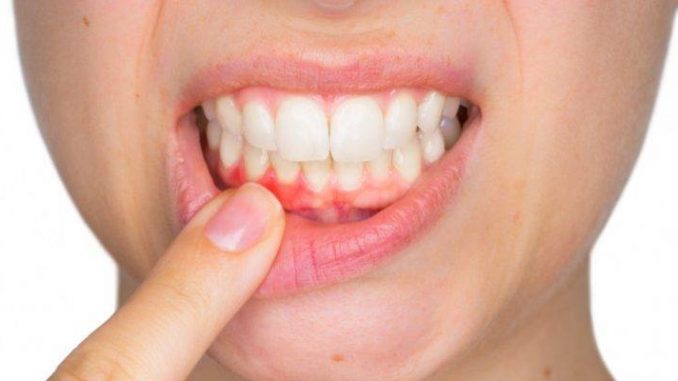
Are red traces left behind when biting apples? Does the spit out toothpaste contain blood after brushing your teeth? Or you have a metallic taste in the mouth? All of these can be symptoms of bleeding gums which is also called gingiva. Let us learn in the following its causes, treatments, and prevention.
Causes of Bleeding Gums:
Bleeding gums is a serious warning sign of your body. It speaks for acute inflammation of your periodontium. This is referred to in professional circles as periodontitis. But the gums themselves can be inflamed and manifest themselves through bleeding gums. If you notice regular bleeding gums, a visit to a dentist with your dentist is indispensable.
The most common cause of bleeding gums: Lack of oral hygiene:
Brushing teeth irregularly and lacking oral hygiene are the most common causes of bleeding in the gingiva and gums. Within a short time after ingestion, a thin layer of plaque forms. If the teeth are cleaned too rarely, this layer thickens.
Finally, the dental plaque manifests in solid form as tartar, which provides particularly good conditions for the bacteria of the plaque. Over time, these bacteria can spread to your gums.
Let us find out other causes in the following.
Bleeding gums due to hormonal changes in pregnancy:
Brushing and very good oral hygiene are even more important during pregnancy and lactation than with non-pregnant women. Only in this way is active prevention of pregnancy-induced gingivitis or periodontitis possible.
Hormonal changes in the body during pregnancy cause your body to react more easily to bacterial plaque. The plaque leads to irritation faster and makes the gums bleed faster. A professional tooth cleaning and the control of your teeth at the beginning of pregnancy can prevent this well.
Bleeding gums due to insufficient filling margins and dentures:
Fillings that have been placed in the interdental space beyond the dental boundaries, press on your gums. This often occurs with amalgam fillings. The permanent pressure of the protruding rim of the filling irritates the gums. It starts to bleed.
In contrast to bleeding gums with a lack of oral hygiene, the gums bleed in this case selectively directly to the filling. Due to this pressure load, the gums also like to retract. It is advisable to consult the best dentist in this case.
Treatments:
Here we will learn about the bleeding gums treatment.
Gingivitis is a generally bacterial oral disease that causes inflammation and bleeding of the gums. It may be caused by poor hygiene, poor diet or digestive problems. It can also influence the growth of wisdom teeth.
Our diet should be rich in the following foods:
· Fresh and seasonal fruit
· Vegetables and salads
· Vegetables
· Wholegrain cereal (rice, millet, quinoa, oatmeal, etc.)
· Nuts and dried fruits
· Seeds (sunflower, sesame, pumpkin)
Things to avoid:
· Milk and dairy products
· Bread
· White sugar
Consume Vitamin C food:
Vitamin C can help us a lot to improve gingivitis. We can consume it daily as a supplement or eat foods that contain it.
Prevention:
In the mouth, there is a constant interplay between bacterial defense and bacterial proliferation. The whole is called oral flora. If bacterial proliferation due to a lack of oral hygiene prevails, various diseases develop in the mouth. The best known are caries and gingivitis.
The best way to prevent bleeding gums is mentioned in the following:
· Regular brushing and good oral hygiene.
· Regular check-ups with your dentist.
· One to two times a year a professional tooth cleaning.
The best prevention of bleeding gums is to prevent gum infections. Those who brush their teeth regularly and neatly in the mornings and in the evenings, effectively protect themselves and their gingiva against periodontitis. Additional mouthwashes are especially recommended for patients with reduced movement function, were not all teeth can be reached and cleaned equally well and intensively.
Regular check-ups with your dentist are also part of the prevention of periodontal disease. Dentists also recommend one to two times a year for professional teeth cleaning.
Smoking narrows your vessels so that the blood circulation in the gums is changed. Also, it lowers the body’s defenses. Bleeding gums are closely associated with smoking.

Leave a Reply